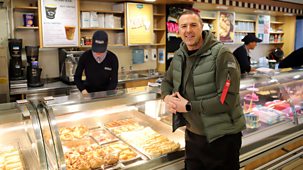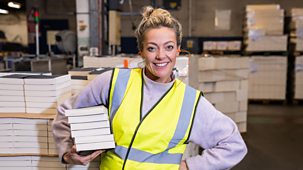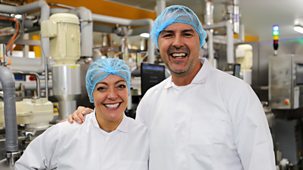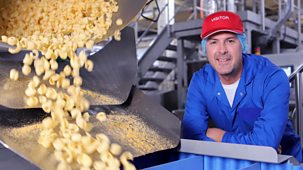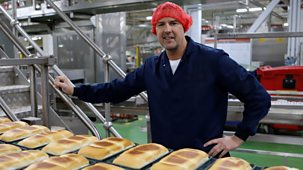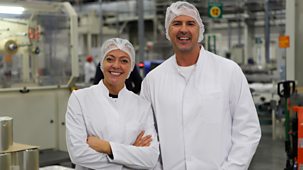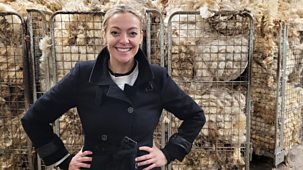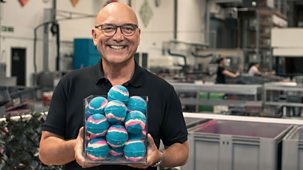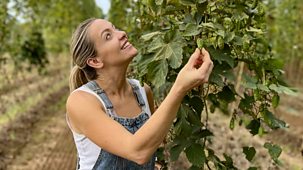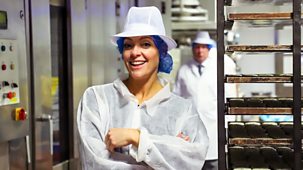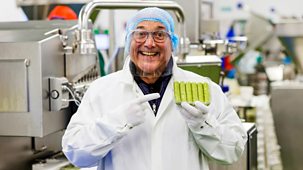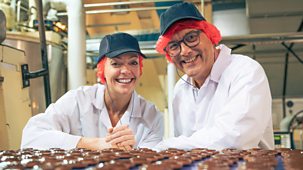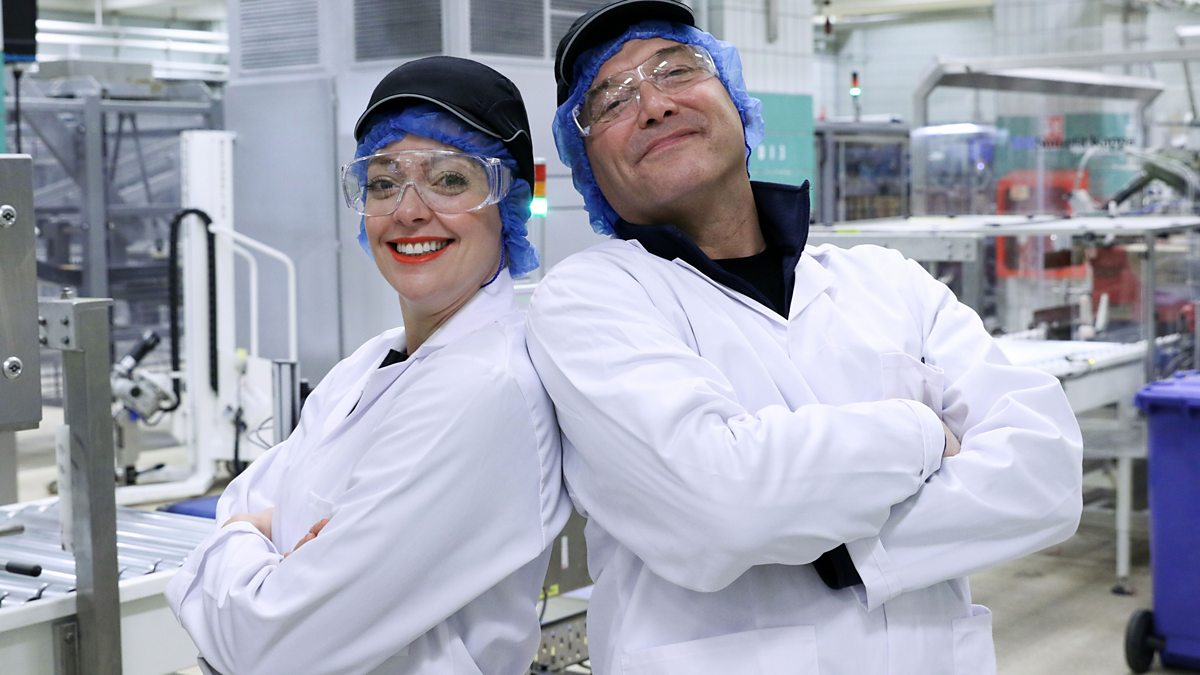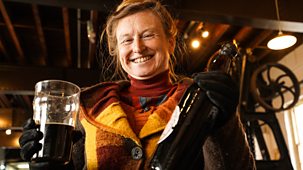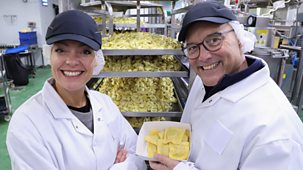
Series 8: 4. Stuffed Pasta
Gregg Wallace explores the Dell Ugo factory in Hertfordshire to reveal how it makes 500 million stuffed pasta parcels every year. \n\nHe’s following production of one of their best sellers, crab and crayfish raviolo, and what better place to start than at the intake bay with a delivery of frozen crayfish tails. Factory manager Cesra Da Rocha explains that they receive around half a tonne a week of the freshwater crustacean, enough to make over two hundred thousand individual raviolo, the slightly bigger cousin of ravioli. \n\nThe delivery is wheeled over to the factory’s kitchen area, where Gregg meets one of the owners, Charlie Ugo. Charlie tells Gregg that, along with crayfish, the other key ingredient is crab. They use a mixture of both white and brown crab meat to balance out the flavours. Before the crab goes into the mixer, Gregg helps to add parsley and coriander, mayonnaise, salt and the crayfish. Then in goes the crab, followed by blue whiting, which is a fish from the same family as cod and haddock, adding a fish stock flavour and texture. Then it’s lobster stick and lemon juice, followed by some very specific mixer timings: 32 seconds in one direction, then 32 in the other. Breadcrumbs are added, and it’s all precisely mixed again. \n\nWith the filling made, it’s time for the pasta, made from special flour milled from durum wheat, which is higher in protein than traditional flour. When the flour is mixed with water, the proteins within the flour combine to form strands of gluten which turns it into dough. The more protein, the more strands are formed and the stronger the dough will be. The factory needs a strong dough to withstand the rigorous processes used to turn it into raviolo. At this factory, they make fresh pasta dough, which requires egg. The ingredients are combined with water, but the mix is nothing like a finished dough yet; it’s too dense, so it’s sent through a specialist machine which folds and kneads it to make it stretchier, before a set of rollers creates two separate continuous sheets of pasta. After passing through two more sets of rollers, the pasta is eventually taken down to the perfect thickness for making into parcels. \n\nWith the pasta made and the filling ready, it’s time to make the raviolo with the help of another clever machine. Gregg watches on as the two pasta sheets enter a stuffed pasta-forming machine. As they pass through, 15 grams of the fishy filling are deposited at precisely spaced intervals, before the pasta is pressed together and cut out by a roller at a rate of 280 a minute. Then the stuffed pasta parcels are sent through a tunnel, where they’re blasted with steam, pasteurising them. The pasteurisation process not only kills microbial activity to extend shelf life, it also sets the gluten stands within the pasta dough, holding them in place and stabilising the shape. Then it’s a quick journey through a drier and into a giant chiller, which brings their core temperature to below four degrees Celsius. \n\nFinally, ten raviolos are portioned into individual packs, and they head to the dispatch area, where they’re loaded into waiting lorries before being sent the length and breadth of the UK. \n\nElsewhere, Cherry Healey visits Cromer on the Norfolk coast to discover the traditional fishing techniques still used to catch the crab for Gregg’s stuffed pasta, and she conducts an intriguing experiment to find out if the music we listen to can affect how we taste food.\n\nHistorian Ruth Goodman learns how Italian immigrants in Bedford helped to build Britain, and she tucks into the extraordinary origins of gluten free food.
Source: BBC 2
Most recent episodes of Inside the Factory
Inside The Factory
Series 9: 6. Sausage Rolls
Paddy McGuinness explores the secrets of the McColgan’s bakery in Strabane, Northern Ireland, to reveal how it makes more than half a million sausage rolls a day. \n\nAft ...
09-02-2025
BBC 2
Inside The Factory
Series 9: 5. Hardback Books
Paddy McGuinness visits the Clays book factory in Suffolk to learn how they produce 20,000 copies of Pride and Prejudice for publisher Penguin. The factory makes an astonishing ...
02-02-2025
BBC 2
Inside The Factory
Series 9: 4. Flapjacks
In this episode, Paddy McGuinness explores the secrets of the Graze factory in west London, revealing how they make 40 million flapjacks a year. \n\nArmed with a trusty tasting ...
26-01-2025
BBC 2
Inside The Factory
Series 9: 3. Cheese Curls
In this episode, Paddy McGuinness explores the secrets of the Walkers factory in Lincoln, to reveal how it makes 500 million packs of Quavers every year. \n\nPaddy begins by mee ...
19-01-2025
BBC 2
Inside The Factory
Series 9: 2. Sliced Bread
In a nostalgic episode of Inside the Factory, new presenter Paddy McGuinness visits the Warburtons bread factory in his hometown of Bolton, where he once worked as a youngster m ...
12-01-2025
BBC 2
Inside The Factory
Series 9: 1. Chocolate Seashells
Paddy McGuinness is fully immersing himself in the festive spirit as he explores a huge chocolate factory in Belgium. With lots of taste tests to enjoy along the way, he embrace ...
28-12-2024
BBC 2
Inside The Factory
Series 8: 7. Carpets
Gregg Wallace explores the Axminster factory in Devon to reveal how it produces 46,000 square metres of carpet every year. He follows the production of one of their best sellers ...
15-11-2024
BBC 2
Inside The Factory
Series 8: 6. Bath Bombs
Gregg Wallace visits the colourful and fragrant Lush factory in Dorset to learn how an astonishing 14 million bath bombs are produced every year.\n\nCherry Healey visits Loughbo ...
09-10-2024
BBC 2
Inside The Factory
Series 8: 5. Stout
Gregg Wallace explores the secrets of the Guinness brewery in Dublin to reveal how it makes two million litres of Irish stout every single day.\n\nCherry Healey visits a water t ...
02-10-2024
BBC 2
Inside The Factory
Series 8: 4. Stuffed Pasta
Gregg Wallace explores the Dell Ugo factory in Hertfordshire to reveal how it makes 500 million stuffed pasta parcels every year. \n\nHe’s following production of one of ...
25-09-2024
BBC 2
Most popular episodes of Inside the Factory
Inside The Factory
Series 7: Mints
Gregg Wallace visits a factory with a menthol scent - the Polos factory in York, which produces 32 million mints every day and contributes to the 19,000 tonnes of mints per year ...
15-08-2024
BBC 2
Inside The Factory
Series 5: 2. Wax Jackets
Gregg Wallace is in South Shields at a clothing factory where they produce 650 waxed jackets a day. He follows the production of water-resistant jackets from the arrival of 500- ...
02-07-2024
BBC 2
Inside The Factory
Series 9: 4. Flapjacks
In this episode, Paddy McGuinness explores the secrets of the Graze factory in west London, revealing how they make 40 million flapjacks a year. \n\nArmed with a trusty tasting ...
26-01-2025
BBC 2
Inside The Factory
Series 7: Trains
When he was a child, Gregg loved playing with toy trainsets. Now he’s got special access to learn how the ultimate model is made: a huge 187-tonne, five-carriage electric ...
29-08-2024
BBC 2
Inside The Factory
Series 7: Crumpets
Gregg Wallace visits the factory making 432 million crumpets every year. Crumpets are a British classic made from a precise combination of ingredients, using some clever chemist ...
24-07-2024
BBC 2
Inside The Factory
Series 7: Vegan Sausages
Gregg Wallace visits a Yorkshire team that churn out up to 90,000 vegan sausages a day! Heck have been making these bangers since 2018, and the process is surprisingly futuristi ...
30-07-2024
BBC 2
Inside The Factory
Series 7: Jaffa Cakes
Gregg Wallace visits a Manchester factory that churns out 6 million Jaffa Cakes every single day - 1.4 billion per year. Cherry Healey is in Jaffa, the city responsible for grow ...
26-06-2024
BBC 2
Inside The Factory
Series 4: 2. Toilet Roll
Gregg Wallace explores the Manchester factory that produces 700,000 toilet rolls a day. He begins 940 miles away in Sweden, where the raw material - wood - is harvested from a s ...
16-08-2020
BBC 2
Inside The Factory
Series 8: 7. Carpets
Gregg Wallace explores the Axminster factory in Devon to reveal how it produces 46,000 square metres of carpet every year. He follows the production of one of their best sellers ...
15-11-2024
BBC 2
Inside The Factory
Series 5: 7. Beer
Gregg Wallace is in Burton upon Trent at Britain’s biggest brewery, where they produce 3 million pints of beer a day. He follows the production of Britain’s best-sel ...
09-04-2019
BBC 2


